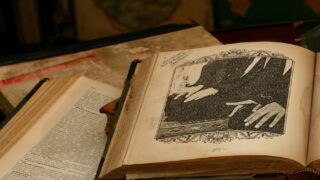The Messenger, may God’s blessings and peace be upon him, directed his ummah to communicate this religion, because in teaching and communicating it to others are protective measures for the listener to hear about this religion from its adherents before he hears from others. He said, may God’s blessings and peace be upon him: “Convey from me even if it is a verse.” May God’s peace and blessings be upon him, said while addressing Ali bin Abi Talib, may God be pleased with him: “Then invite them to Islam and tell them what they must give as God’s right in what the have. By God, for God to guide one man through you is better for you than red camels” (Bukhari). This is a stimulus and encouragement from him, may God’s blessings and peace be upon him, for his ummah to be keen to obtain credit and reward in this great chapter.
As for what he, may God’s blessings and peace be upon him, did, in his biography there is much that can be cited in this section. “Muhammad bin Ishaq, may God have mercy on him, mentioned many stories after the annulment of the written agreement, including the invocation of the Quraysh’s enmity against the Messenger of God, may God bless him and grant him peace, and alienating the neighborhoods of Arabs and those coming to Mecca for Hajj or Umrah Or something else from him, and God manifesting miracles at his hands, an indication of his sincerity in what he brought them of clear proofs and guidance, and a refusal to them of what they accuse him of oppression, aggression, cunning and deception, and they accuse him of madness, witchcraft, fortune-telling and telling on behalf of God what He did not say, among that is the story of At-Tufail ibn Amr al-Dawsi, and he was an obedient and honorable master in Daos And he had come to Mecca, and the nobles of Quraysh gathered with him and warned him of the Messenger of God and forbade him to meet with him or hear his words.
He said: By God, they stayed with me until I agreed that I would not hear anything from him or speak to him, until I stuffed my ears when I went to the mosque with cotton pads, so that I could not hear anything of what he said, and I did not want to hear it.
So I went to the mosque, and saw the Messenger of God, may God bless him and grant him peace, standing and praying at the Kaaba.
He said: I got up soon, but God refused but to let me hear some of what he said.
He said: So I heard good words. He said: I said to myself: I am a bereavement to my mother! By God, I am an intelligent, poetic man whose good and bad things are not hidden from, so what prevents me from hearing what this man says, and if what he brings is good, I accept him, and if he is ugly, I leave him .
He said: I stayed until the Messenger of God, may God bless him and grant him peace, went to his house, so I followed him until when he entered his house, I entered upon him and said: O Muhammad, your people told me such and such. to whom they said.
He said: By God, they continued to frighten me about your matter until I blocked my ears with a flute so that I would not hear your words. Then God refused but to let me hear your words, so I heard a good word, so present your matter to me.
He said: Islam was presented tome by the Messenger of God, may God’s blessings and peace be upon him, and he recited the Qur’an to me. By God, I have never heard a saying better than it, nor something more just than it.
He said: I embraced Islam and bore the testimony of the truth, and I said: O Prophet of God, I am an obedient person among my people, and I will return to them and invite them to Islam, so pray to God to give me a sign that will be of help to them in what I call them to.
He said, “Oh God, make for him a sign . “
He also recommended this matter to his companions when he sent them as messengers to the people of Yemen, namely Ali bin Abi Talib, Muadh bin Jabal and Abu Musa Al-Ash’ari, may God be pleased with them. He gave them a number of advice for the duty to advocate and improve the image of Islam. Among his advice was: “give glad tidings and do not alienate, thread easily and do not make things difficult. Cooperate and do not disagree.” And He, peace and blessings of God be upon him, said: “Make easy and do not make things difficult, and give good tidings and do not alienate” (Bukhari). Likewise, among the general commandments to the Companions of the Prophet, may God’s blessings and peace be upon him, in calling is his advuce to Abu Dharr, may God be pleased with him, he said: The Messenger of God, may God’s blessings and peace be upon him, said to me: “Fear God wherever you are, and follow a bad deed with a good deed that erases it, and relate with people with a good character.” (Narrated by Al-Tirmidhi).
Among the most famous directions and prophetic commandments to Muadh when he sent him to the people of Yemen, as was reported from Ibn Abbas “that Muadh said: The Messenger of God, may God’s blessings and peace be upon him, sent me and said: You are heading to a people from the People of the Book, so invite them to testify that there is no god but Allah and that I am the Messenger of God, if they obey So; So let them know that God enjoined five prayers on them every day and night. If they obeyed you to that, let them know that God has enjoined upon them a charity that is taken from their rich and given to the poor, and if they obey that; Beware of the most beloved of their wealth, and beware of the supplication of the oppressed; There is no veil between it and God” (Al-Bukhari).
From these many directives from the Prophet, may God’s blessings and peace be upon him, to his ambassadors, it becomes clear to us the great interest in the call to improve the image of Islam among non-Muslims, as he, may God’s blessings and peace be upon him, instructed them to be easy and to avoid difficulty, to behave in preaching and avoid alienation, to be gentle in all matters, and to behave gradually and carefully Communicating, informing in the most beautiful and gentlest ways, respecting people’s rights, property and money, avoiding injustice and harming people, whether Muslim or non-Muslim.
The Prophet, may God’s blessings and peace be upon him, did not care about improving the image of Islam in content, but rather focused on form as well. He chose his messengers for kings, and among them was Dihya bin Khalifa al-Kalbi, whom he sent to Heraclius, the king of the Romans. And he was handsome, and that is to give a different picture of what Rome knew about Arabs of scurrility and lack of interest in appearance. Which made him accept his call and ask about the Prophet, may God bless him and grant him peace, who he knows among the Arab leaders, and the mental image that was imprinted on him from his discussion with Abu Sufyan bin Harb appears.

















